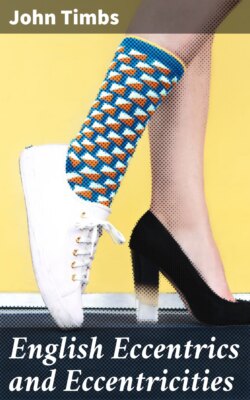Читать книгу English Eccentrics and Eccentricities - John Timbs - Страница 34
На сайте Литреса книга снята с продажи.
The Rothschilds.
ОглавлениеTable of Contents
In the Memoirs of Sir Thomas Fowell Buxton, edited by his son, we find this amusing letter, dated 1834: "We yesterday dined at Ham House, to meet the Rothschilds; and very amusing it was. He (Rothschild) told us his life and adventures. He was the third son of the banker at Frankfort. 'There was not,' he said, 'room enough for us all in that city. I dealt in English goods. One great trader came there, who had the market to himself; he was quite the great man, and did us a favour if he sold us goods. Somehow I offended him, and he refused to show me his patterns. This was on a Tuesday; I said to my father, "I will go to England." I could speak nothing but German. On the Thursday I started. The nearer I got to England, the cheaper goods were. As soon as I got to Manchester, I laid out all my money, things were so cheap; and I made good profit. I soon found that there were three profits—the raw material, the dyeing, and the manufacturing. I said to the manufacturer, "I will supply you with material and dye, and you supply me with manufactured goods." So I got three profits instead of one, and I could sell goods cheaper than anybody. In a short time I made my 20,000l. into 60,000l. My success all turned on one maxim. I said, I can do what another man can, and so I am a match for the man with the patterns, and for all the rest of them! Another advantage I had. I was an off-hand man. I made a bargain at once. When I was settled in London, the East India Company had 800,000 ounces of gold to sell. I went to the sale, and bought it all. I knew the Duke of Wellington must have it. I had bought a great many of his bills at a discount. The Government sent for me, and said they must have it. When they had got it, they did not know how to get it to Portugal. I undertook all that, and I sent it through France; and that was the best business I ever did.'
"Another maxim, on which he seemed to place great reliance, was, never to have anything to do with an unlucky place or an unlucky man. 'I have seen,' said he, 'many clever men, very clever men, who had not shoes to their feet. I never act with them. Their advice sounds very well; but fate is against them; they cannot get on themselves; and if they cannot do good to themselves, how can they do good to me?' By aid of these maxims he has acquired three millions of money. 'I hope,' said ——, 'that your children are not too fond of money and business, to the exclusion of more important things. I am sure you would not wish that.'—Rothschild: 'I am sure I should wish that. I wish them to give mind, and soul, and heart, and body, and everything to business; that is the way to be happy. It requires a great deal of boldness and a great deal of caution to make a great fortune; and when you have got it, it requires ten times as much wit to keep it. If I were to listen to all the projects proposed to me, I should ruin myself very soon. Stick to one business, young man,' said he to Edward; 'stick to your brewery, and you may be the great brewer of London. Be a brewer, and a banker, and a merchant, and a manufacturer, and you will soon be in the Gazette.
"'One of my neighbours is a very ill-tempered man; he tries to vex me, and has built a great place for swine close to my walk. So, when I go out, I hear, first grunt, grunt, squeak, squeak; but this does me no harm. I am always in good humour. Sometimes to amuse myself I give a beggar a guinea. He thinks it is a mistake, and for fear I should find it out, off he runs as hard as he can. I advise you to give a beggar a guinea sometimes, it is very amusing.' The daughters are very pleasing. The second son is a mighty hunter, and his father lets him buy any horses he likes. He lately applied to the Emperor of Morocco for a first-rate Arab horse. The Emperor sent him a magnificent one; but he died as he landed in England. The poor youth said very feelingly, 'that was the greatest misfortune he ever had suffered;' and I felt strong sympathy with him. I forgot to say, that soon after Mr. Rothschild came to England, Bonaparte invaded Germany. 'The Prince of Hesse Cassel,' said Rothschild, 'gave my father his money; there was no time to be lost; he sent it to me. I had 600,000l. arrive unexpectedly by the post; and I put it to such good use, that the Prince made me a present of all his wine and his linen.'"
